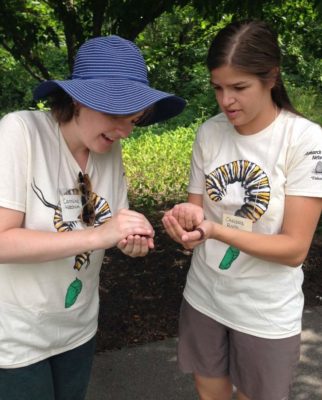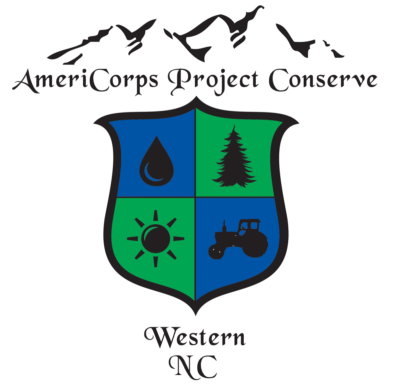Impacts of service to WNC are deeper than they appear
Project Conserve completes another year of service in 2015

This summer, another class — this being the 10th, dating back to 2005 — of Project Conserve members reached the end of their 11-month AmeriCorps terms.
Thirty-one dedicated souls each completed 1,700 hours of service to WNC, improving trails and waterways, stewarding public lands, engaging volunteers, and educating our community about the environment.
I enjoyed getting to know four of these individuals who served to protect and improve our region’s natural heritage during the past year. Observing their contributions to our communities while also watching their personal and professional evolutions was particularly rewarding.
They not only made our region a better place, but their experiences and varying scopes of service grew their minds, widened their perspectives, and ultimately made them better people.
“Project Conserve gave me opportunities to learn, discover, and develop as a professional and as a person,” said Caroline Ketcham, a UNC-Asheville graduate originally from New Hampshire. “There was always a chance to uncover a new interest or obtain a new skill.”
Ketcham’s service focused on volunteer recruitment and management, seeking to attract helping hands from the community to aid conservation projects. “I love to share the things I care about with others, especially when I can see a spark of my enthusiasm light up in someone else.”
But Ketcham also developed new skills herself during her service, while simultaneously expanding her perspective about improving the environment.
“I’ve been called a treehugger more times than I can count,” said Ketcham, who explained that it is most often a compliment. “But I do love trees.”
So it was strange to Ketcham when she found herself in the woods donning a hard hat and holding a saw. She and several Project Conserve members took advantage of an opportunity to become chainsaw certified, successfully dropping several white pines in the process.
“It was frightening at first, but once I made my first cut, I was hooked. Had my first real taste of using a power tool turned me from a tree hugger into a killer?”
Ketcham’s new skill also came with a revelation that cutting trees can be a crucial part of keeping an ecosystem vibrant and healthy.
“Nature has many strategies of its own to create disturbance in the forest, like wildfire and storms,” she said. “Many species of plants and animals rely on it. While mature trees are important, so are areas of new forest which serve as habitat to provide food, nesting areas, and other benefits for wildlife.”
Ketcham’s lesson went beyond the knowledge of felling a tree, but taught her that when natural disturbances are interrupted because of human intervention, often people need to mimic them to keep the forest healthy. “Just like diversity of species is a good thing, so is diversity of habitat.”
Megan Rayfield, another UNC-Asheville grad, focused her 11 months of service on stewarding and improving local protected lands.
“Conservation easements protect natural heritage values like contiguous forest areas, trout waters, farms with fertile soils, and critical habitat for rare and threatened species,” she said.
Rayfield, who also holds a master’s degree in environmental management from Duke University’s Nicholas School of the Environment, devoted much of her stewardship efforts to improving habitat for the bunched arrowhead, one of the rarest plants in our region.
Rayfield worked with multiple partners, including the U.S. Fish and Wildlife Service and N.C. Natural Heritage Program, to coordinate Carolina Mountain Land Conservancy’s (CMLC) initiative to restore and improve rare mountain bogs in Flat Rock. These bogs host the unique flower, as well as other imperiled species like pitcher plants and bog turtles.
Like Ketcham, her service greatly benefited the land. “I’m pleased to know that my service not only makes a difference today, but will continue to have effects for years to come,” said Rayfield.
She, too, gained invaluable knowledge and experience along the way. “I’m thankful to have had the opportunity to learn from so many amazing conservation professionals.”
After completing her degree at Columbus State, Sarah Harden relocated from Georgia to serve with Project Conserve.
“Much of my time focused on connecting with the community,” she said. “I sought to connect people to the land, and showcase why land conservation benefits everyone.”
As part of her service, Harden launched a free, monthly speaker series. Presenters included authors, scientists, and conservationists who spoke about natural or cultural heritage — topics that reinforced a human connection to the land in WNC.
She also led hikes on conserved properties, enabling community members to experience the land up close and personal. “If visitors can get on the land to see it, touch it, and be inspired by it, I think protecting our natural resources is appreciated on a deeper level.”
And while some of her hikes may have expanded the horizons of attendees, a few of those visitors broadened her own perspective. Last winter, Harden partnered with students and parents from Atkinson Elementary School to lead a hike to the top of conserved Bearwallow Mountain.
“The way the kids think and connect ideas is really different from what I’m used to,” she recalled. “But when I was able to get them to understand, they lit up.”
One of her favorite memories was the energy of the children bounding up the trail. It was then she realized that her brief time with the students could possibly have a long-lasting impact on their young minds.
“Maybe, just maybe, something I said on the hike will inspire some of them to do great things when they get older. They could become future conservationists.”
Chelsea Rath graduated from Appalachian State University and joined Project Conserve to serve the Weed Action Coalition of the Hickory Nut Gorge (WAC-HNG), a CMLC initiative to combat invasive species that outcompete and threaten survival of native plants in the particularly biodiverse Gorge.
Presenting to school classes, community groups, and landowners about WAC-HNG’s mission was a particular focus of Rath’s service. This education proved to be one of the most impactful components of her AmeriCorps term.
“I know how incredibly important education is, though I never pictured myself as a teacher of any kind,” she said. “Now I’m excited to know that wherever my life may lead me, I will always be able to teach others about things which I am passionate.”
Rath’s recent service led her to continue pursuing both the environment and education. In addition to recently enrolling in the N.C. Environmental Education Certification program, she committed to serving a second term through AmeriCorps Project Conserve.
These four women and their dedication to WNC this past year reminded me that their service does not terminate after eleven months. Instead, the skills they gained, lessons learned, and values that deepened will make them forever more capable and driven to serve their communities, wherever their lives may lead them.
“I may have only served at CMLC for eleven months, but it was the greatest experience of my life. I was part of an organization that was making a tangible difference in the region, not only through conservation, but in people’s lives,” Sarah Harden said of her AmeriCorps service. “And in so many ways, it made a difference in mine.”
CMLC initiated Project Conserve in 2004, and since then the program has contributed more than 410,000 hours of service to WNC.
CMLC has protected more than 28,000 acres of lands that you love — and need — along the Blue Ridge Escarpment, French Broad River Valley, Hickory Nut Gorge, and beyond since its inception in 1994. For more information and to support land conservation in WNC, visit carolinamountain.org. For more information about Project Conserve, visit americorpsprojectconserve.org.

Author Peter Barr is trails and outreach coordinator for Carolina Mountain Land Conservancy.